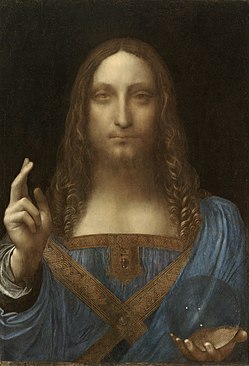The unveiling of the world’s most expensive painting at the Louvre Abu Dhabi has been delayed, the Department of Culture and Tourism – Abu Dhabi (DCT Abu Dhabi) has announced.
Salvator Mundi by Leonardo da Vinci, which was acquired by DCT Abu Dhabi at a Christie’s auction in New York for $450 million (AED1.65 billion) in November last year, was meant to be displayed on September 18, but will now be postponed to a later date. More details will be “announced soon”, DCT Abu Dhabi said.
The painting is one of less than 20 known surviving paintings by the Italian Renaissance master.
The oil on panel work dates from around 1500 and depicts a half-length figure of Christ as Saviour of the World. Facing the viewer, he is dressed in flowing robes of lapis and crimson, while holding a crystal orb in his left hand as he raises his right hand in benediction.
The work is believed to be a contemporary of La Belle Ferronnière and the iconic Mona Lisa, having been found in the inventory of the royal collection of King Charles I (1600-1649).
Though it was initially believed to have been destroyed, the Salvator Mundi was rediscovered in 2007 and restored by Dianne Dwyer Modestini, Senior Research fellow and Conservator of the Kress Program in Paintings Conservation at the Conservation Center of the Institute of Fine Arts, New York University.
The Louvre Abu Dhabi opened in November last year after more than a decade in the making, with French President Emmanuel Macron having been among its first visitors.
Flagged as “the first universal museum in the Arab world”, it sits on the low-lying Saadiyat Island, a developing tourism and culture hub 500 metres (1,600 feet) off the coast of the UAE’s capital.
Under a 30-year agreement, France provides expertise, loans works of art and organises temporary exhibitions – in return for one billion euros ($1.16 billion).
The Louvre in France takes a 400-million-euro share of that sum for the use of its name up to 2037.
For the next 10 years, the Paris museum will lend works to its Abu Dhabi partner on a voluntary basis, for a maximum of two years.













